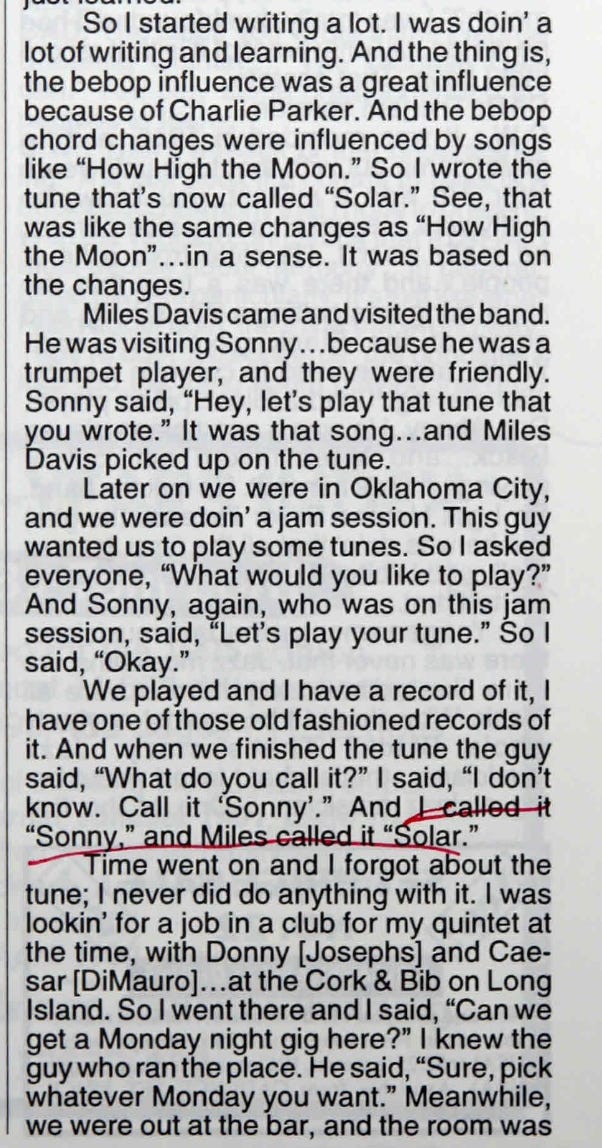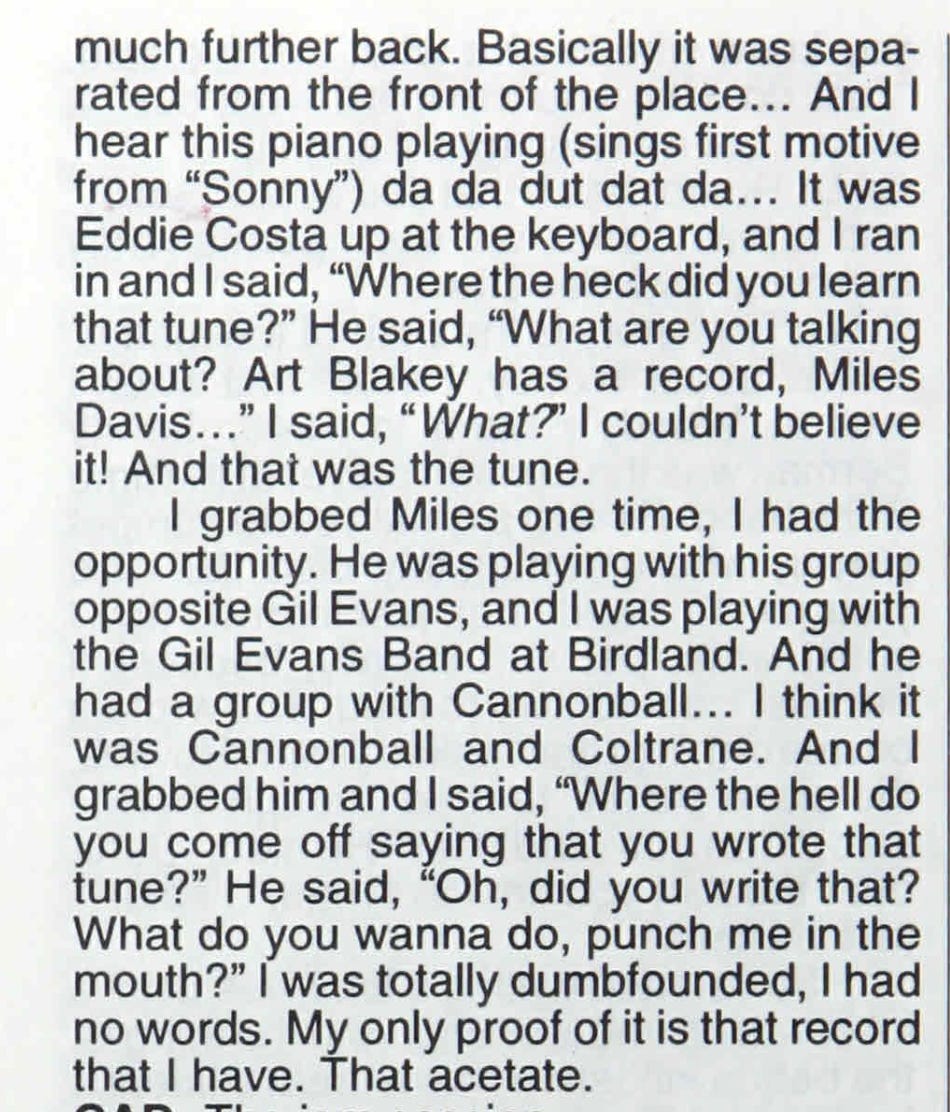(Paying subscribers, a long print interview with guitarist Chuck Wayne is attached for you at the bottom.)
OK, you’ve read my previous essay, and you know two key points about composer credits on recordings:
When a piece is being recorded for the very first time, and there is some room for legitimate debate as to who composed it, it is to the financial advantage of the record label to say that it was composed by an artist who is under contract to them. This is particularly true when the label has a publishing division.
Put slightly differently, from the musician’s side, there is always a certain amount of pressure on an artist who has a recording contract, to record pieces that he or she has composed, and to let the label serve as copyright owner and publisher for those pieces.
And again, I am not saying that Miles was totally innocent. I am saying that it is not a simple matter of him “stealing” tunes. Instead, it is a complicated question of how the music business is structured.
OK, so let’s move on to some of the questions that I promised to address:
How did Miles learn “Solar”? What is the evidence?
As you saw last time, it was Prestige Records, not Miles, who filed the paperwork claiming the copyright to “Solar” and listing Davis as the composer. But it has been well known among musicians for many years that “Solar” was written by guitarist Chuck Wayne. I heard that from my late friend, pianist Don Friedman, around 1987, and from others as well. I never had any reason to doubt it.
Chuck Wayne talked about this when he was interviewed at length in the jazz magazine Cadence in August 1996 (sorry, my only copy has somebody’s underlining):
(Paying subscribers, the entire fascinating interview is attached for you at the bottom.)
“Sonny” refers to trumpeter Sonny Berman (1925-1947), a prodigy who recorded behind Louis Prima at age 14 (!). He is best known for his work with Woody Herman’s big band. Wayne was the guitarist in the band during the last part of Berman’s tenure there.
Miles’s group played opposite (that is, alternated sets with) the Gil Evans group at Birdland from April 16 to April 29, 1959, so that is when Chuck confronted Miles.
Now, there are a number of important points here:
—Wayne does not know how the tune got credited to Miles, but he assumes, wrongly, that it was entirely Miles’s doing.
—He reports that Miles did not know that Chuck wrote it. More on that below.
—Miles was flippant and dismissive when Wayne told him that it was his tune. I think we’d all agree that that was not a sensitive way for Miles to handle the situation!
—Wayne says the tune is based on “How High the Moon.” That’s correct, of course—he composed it! But a number of people have asked me how it could be related to “How High..” I’ll explain that next time.
—What about Wayne’s claim that he had a private recording made on a 78 rpm acetate disc at a jam session in 1946? Absolutely true! We will listen to it below.
But if Miles heard the tune in 1946, as Wayne recounts, how did he end up recording it in 1954? It is not likely that Miles suddenly remembered it eight years later. I’ve seen comments online where people are trying to document occasions when Davis and Wayne worked together. But that misses the point.
The point is that musicians have always shown each other tunes that they wrote, and also tunes they had learned. Tunes get passed around among musicians, sometimes entirely by ear, and sometimes written down by hand, but not always with a composer’s name attached. (And copy machines did not exist until many years later.) One musician might say, “Let’s play this cool tune I heard called ‘Sonny.’ Let me write the chords out for you.”
I’ve already shown that “Impressions” circulated among musicians so much that two bands released recordings of it before Coltrane’s own version came out! “Tenor Madness” and “The Theme” (aka “52nd Street Theme”) were recorded over the years under different names and with different composers credited. Another example is the blues theme "Freight Trane," a 1958 recording on the Prestige label by Coltrane and Kenny Burrell. Tommy Flanagan is listed as the composer, but he told me that he didn’t write it. So I asked Burrell, who wrote me a letter saying that this tune was played around Detroit, but "we did not know the composer."
Another point to know is that Miles was notorious for having a bad memory, mis-remembering the year of even fairly recent events, and so on. And he was known to be impatient when he couldn’t remember names and dates, to say “Who cares?,” not wanting to make the effort to recall details.
In short, by the time Miles recorded Wayne’s tune, it was almost certainly circulating among musicians, by ear or on paper, without Wayne’s name connected to it. And when Wayne told Miles he had written it, it’s surely true that Miles didn’t recall hearing Wayne play the tune eight years earlier. (That doesn’t excuse Davis’s rude response to Wayne, of course.)
How does Miles’s version compare with Chuck Wayne’s original?
Let’s be clear: There is no doubt that “Solar” is Chuck Wayne’s tune “Sonny.” Wayne’s 1946 recording of “Sonny” was found in 2011 when his widow donated his collection to the Library of Congress. A year later, Larry Appelbaum, former jazz specialist at the Library, only posted an excerpt, but it contains the entire theme. It plays in Db, a half-step higher than “Solar,” but it’s possible that Wayne’s disc was running too fast when it was dubbed. There’s an intro, and the theme starts at 0:06. Please listen:
And here is Miles’s version from 1954, in C and at a slower, relaxed tempo:
That is clearly the same theme. Miles plays the melody freely, but the only definite difference is in the last measure. Here is a leadsheet—the last measure as given here is not the same as either of the above recordings:
Next time we will look at the chords of both versions, and will study their connection with “How High The Moon.” We’ll also discuss the names “Sonny” and “Solar.”
And in future installments we will look at many other tunes.
And as always, I will post essays on other topics, in the order that I complete the research on each one.
All the best,
Lewis
Keep reading with a 7-day free trial
Subscribe to Playback with Lewis Porter! to keep reading this post and get 7 days of free access to the full post archives.





